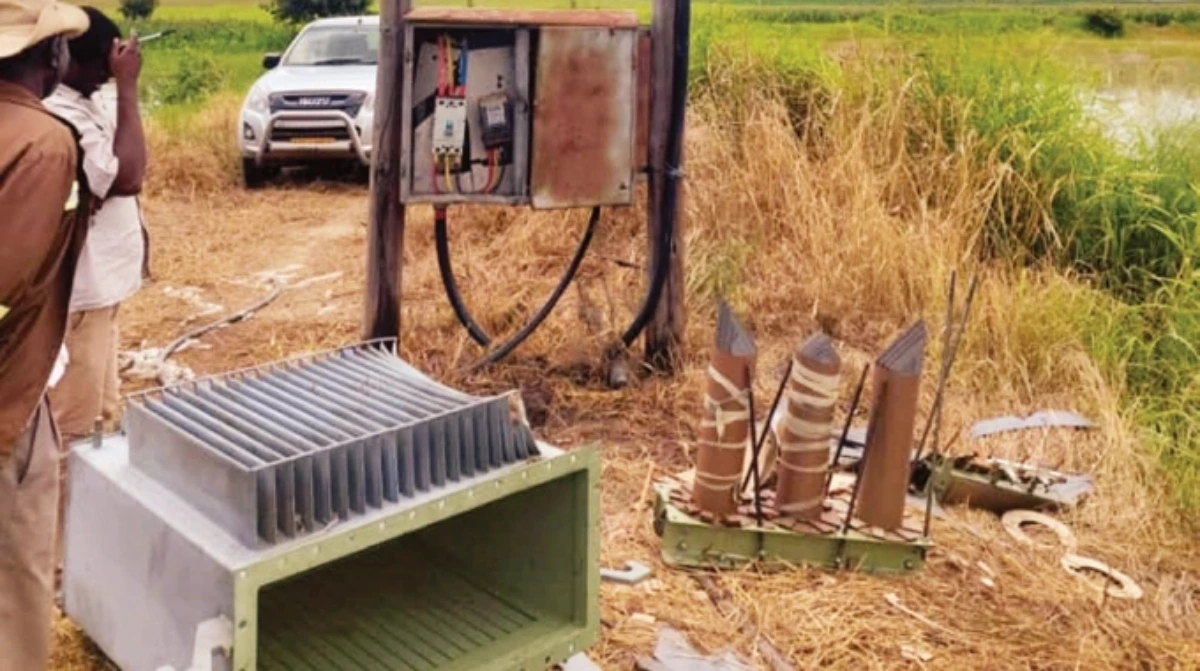
The vandalism of ZESA’s electricity infrastructure in Chitungwiza has reached alarming levels, leaving residents grappling with prolonged power outages and rising costs.
Theft of power cables, destruction of transformers, and other acts of sabotage have plunged entire neighborhoods into darkness, disrupting livelihoods, education, and businesses. This growing menace has sparked outrage and concern, as the community faces the consequences of a problem that goes beyond inconvenience.
Transformers and cables are frequently targeted by criminals who strip them for valuable metals, leaving entire sections of the town without power for weeks. Residents have repeatedly reported such incidents, yet the perpetrators often remain at large, intensifying frustrations. The disruption caused by these acts has affected every aspect of life. Businesses have been particularly hard-hit, with many small enterprises unable to operate without electricity. The ripple effects are devastating, as economic activity slows and households struggle to cover the additional costs of alternative energy sources.
Mrs. Kudzai, who runs a butcher shop in Chitungwiza, shared how the vandalism has brought her business to a standstill. “We’ve been without electricity for two weeks because thieves destroyed the transformer in our area. I’ve lost so much stock due to spoilage. I rely on refrigeration to keep meat fresh, and without power, I can’t do anything. My income is gone, and I’m still expected to pay rent for the shop,” she said, visibly distressed. She called on ZESA and the police to urgently intervene, emphasizing that such incidents were crippling small businesses and threatening livelihoods.
Another resident, Mr. Lloyd Nyare from Unit M, expressed similar concerns, highlighting the challenges of living without power. “This is not just about inconvenience—it’s about our safety and livelihoods. The authorities need to act swiftly to stop this crisis,” he said. Mrs. Nyasha Runya of St. Mary’s also weighed in, lamenting the burden placed on families. “We rely on electricity for everything, from cooking to studying. Now we’re spending extra money on candles and firewood. It’s disheartening to see such destruction while those responsible for protecting these resources seem unbothered,” she said.
ZESA Holdings has admitted that vandalism is costing the power utility millions of dollars annually, funds that could have been used to improve services and expand the electricity grid. Despite repeated appeals for vigilance, the utility’s efforts to curb the problem appear to be falling short. Residents argue that ZESA needs to invest in stronger measures, including tamper-proof equipment, surveillance technology, and better community engagement to safeguard infrastructure. Meanwhile, the Zimbabwe Republic Police (ZRP) has come under fire for failing to apprehend and prosecute those responsible for these crimes. Residents believe that increased patrols and stiffer penalties for offenders could deter future acts of vandalism.
As the festive season approaches, the fear among Chitungwiza residents is palpable. Many worry that the criminals responsible for these acts may intensify their operations, leaving more families in darkness during a time meant for celebration. The lack of decisive action from authorities has left communities feeling vulnerable and abandoned. There are growing calls for urgent interventions to address the crisis, with residents demanding a united effort between ZESA, the police, and the government to protect vital infrastructure.
The vandalism of electricity infrastructure in Chitungwiza is not just a local issue; it is a reflection of a broader national crisis that threatens Zimbabwe’s economic and social stability. Electricity is a lifeline for development, and its disruption has far-reaching consequences for everyone. Authorities must act swiftly and decisively to put an end to this problem before it spirals further out of control.
For the residents of Chitungwiza, hope lies in the prospect of real action and a commitment to safeguarding the country’s energy future.





The rate at which electricity equipment is vandalized is alarming. The government is urged to put in place deterrent sentences, even life in prison for these saboteurs. It can not continue to be business as usual. Enough is enough